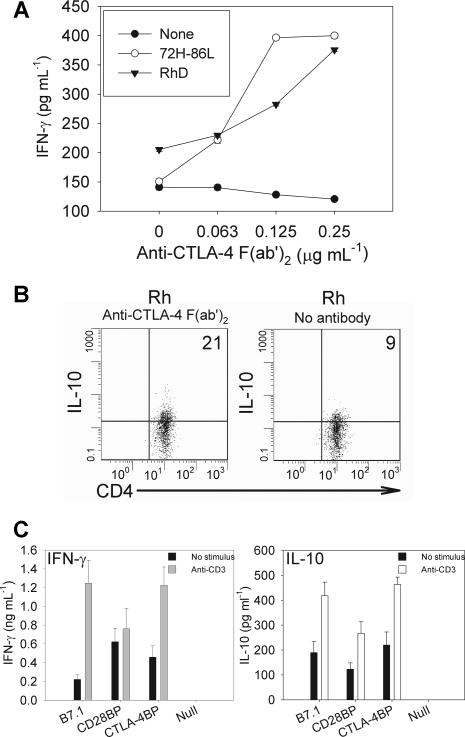Figure 6.
Contribution of costimulatory molecule CTLA-4 to maintaining Tr clone cytokine phenotype. Tr clone cells (1 × 105/mL) were incubated with CD4 depleted, irradiated autologous antigen-presenting cells (1 × 106/mL) in the presence of stimuli for 4 days at 37°C, 5% CO2. (A) Blockade of CTLA-4 with F(ab′)2 antibody fragment deviates the response of autoreactive Tr clone P8(1) against presentation of either cognate peptide 72H-86L (○) or Rh protein autoantigen (▾) toward IFN-γ secretion, but not control cultures stimulated with irrelevant peptide (●). (B) Cytometric analysis showing that number of IL-10+ production by the Tr cells in response to presentation of Rh protein is reduced by anti-CTLA-4 F(ab′)2 antibody fragment blockade during cell culture. Number of IL-10 positive cells are represented in upper right quadrant as a percentage of the total CD4+ T-cell population. (C) Enhancement of IL-10 and IFN-γ by TR clone P8(1) after ligation of CTLA-4. Adherent HEK293 cells transfected with wild-type B7.1 (CD80), CD28BP (selectively binds CD28), CTLA-4BP (selectively binds CTLA-4), or empty vector (Null) were irradiated (50 Gy [5000 rad]), washed, and allowed to adhere to 24-well plates for 24 hours. P8(1) clones (1 × 105/mL per well) were incubated in plates containing transfected cells with no stimulus or anti-CD3 stimulatory antibody for 96 hours at 37°C, 5% CO2. Data are presented as mean plus or minus standard error.

